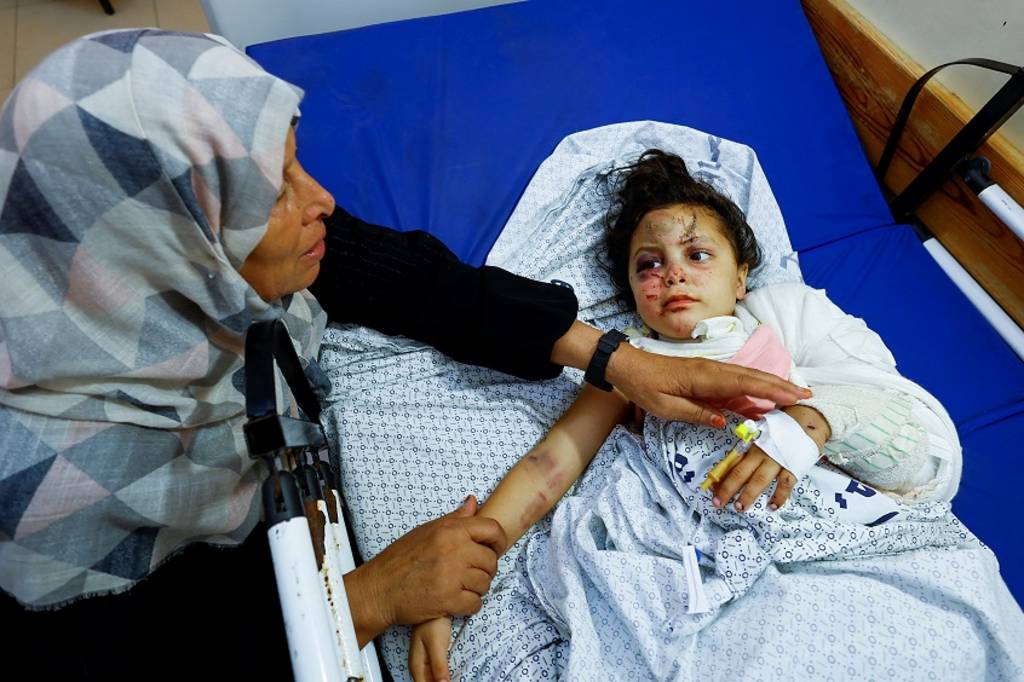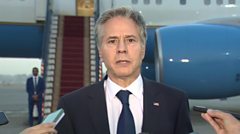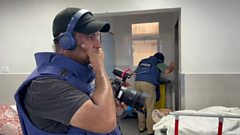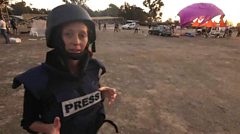
Fuel reserves at Gaza hospitals likely to run out in 24 hours, UN warns
With updates from Rushdi Abu Alouf in Gaza; Lyse Doucet, Lucy Williamson and Nick Beake in southern Israel; Jeremy Bowen, Yolande Knell, Tom Bateman, Alice Cuddy and Joel Gunter in Jerusalem; Anna Foster in northern Israel; and Hugo Bachega in southern Lebanon.
Related Video and Audio
RTL











Live Reporting
Edited by Aparna Alluri
All times stated are UK
Get involved
-
Reuters is just reporting that the US, Israel and Egypt have agreed to a ceasefire in southern Gaza to coincide with the reopening of the Rafah crossing on the Gaza-Egypt border. We had earlier seen media reports saying the Egyptian-controlled Rafah crossing - now the only possible road out of Gaza - will be open "for a few hours" on Monday
- US Secretary of State Antony Blinken is expected to return to Israel on Monday, following talks with Egyptian President Abdel Fattah El-Sisi on Sunday.
-
Southern Gaza's largest city Khan Younis is now a temporary home for hundreds of thousands of people who fled Gaza City in the last few days. Our correspondent Rushdi Abu Alouf, who has moved there with his family, said the city is overwhelmed and scarce resources are fast running out
-
The US has named former ambassador David Satterfield as a special envoy for Middle East Humanitarian Issues. Several world leaders and top diplomats have also been in talks over the weekend in efforts to prevent the conflict from escalating
-
The UN says the Middle East "is on the verge of the abyss" and has asked Israel to let humanitarian aid into Gaza

Getty ImagesCopyright: Getty Images The Middle East "is on the verge of the abyss", the UN saysImage caption: The Middle East "is on the verge of the abyss", the UN says 
ReutersCopyright: Reuters 

Getty ImagesCopyright: Getty Images Gazans, many of them with foreign passports, waiting at the Rafah border crossingImage caption: Gazans, many of them with foreign passports, waiting at the Rafah border crossing 

.Copyright: . 
GettyCopyright: Getty Israeli air strikes have killed more than 2,000 people in Gaza, say Palestinian officalsImage caption: Israeli air strikes have killed more than 2,000 people in Gaza, say Palestinian officals 
Getty ImagesCopyright: Getty Images The Rafah border crossingImage caption: The Rafah border crossing 
ReutersCopyright: Reuters The comments from Israel's ambassador to the UN were made in response to US President Joe Biden saying the country must not "occupy Gaza"Image caption: The comments from Israel's ambassador to the UN were made in response to US President Joe Biden saying the country must not "occupy Gaza" 
ReutersCopyright: Reuters 
ReutersCopyright: Reuters Shirel Hogeg's sister and her family were seriously injured during the attack on Kfar AzaImage caption: Shirel Hogeg's sister and her family were seriously injured during the attack on Kfar Aza 
ReutersCopyright: Reuters Palestinian President Mahmoud AbbasImage caption: Palestinian President Mahmoud Abbas 
EPA/EFECopyright: EPA/EFE Ayman Safadi has warned of the conflict escalating to the wider regionImage caption: Ayman Safadi has warned of the conflict escalating to the wider region
Latest PostThe latest from Gaza and Israel
We are now moving our live coverage onto a new page. Follow us there for the latest updates.
Meanwhile, here's what's been happening in the last few hours:
Hamas says it has no information on ceasefire - report
The Hamas media office says it has no information about the proposed humanitarian truce at the Rafah border crossing, Reuters reports.
What is the Rafah crossing?
Egypt's Rafah border is the only exit route from Gaza's not controlled by Israel. It is now the only possible road out of Gaza after Israel blockaded all other exits.
The crossing lies in the south of Gaza on the border with Egypt's Sinai peninsula, a sparsely populated desert region. The cities on both sides of the border are known as Rafah.
Israeli airstrikes in the past week have also hit the border crossing, according to reports.
Egypt has tightly restricted the opening of the crossing as its relations with Hamas have been badly strained.
Our correspondent Lyse Doucet reported from the crossing in July 2014.
Ceasefire in south Gaza as crossing opens: Reuters
Reuters, citing two Egyptian security sources, is reporting that the US, Israel and Egypt have agreed to a ceasefire in southern Gaza at 9am local time - to coincide with the reopening of the Rafah border crossing.
Rafah crossing may only open for a limited time - US state department
The US anticipates the situation at the Rafah crossing will "remain fluid and unpredictable" ahead of reports it will open at 09:00 local time.
Issuing advice to Americans in Gaza, the US says it is unclear whether or for how long people will be permitted to transit the southern crossing with Egypt's border.
"If you assess it to be safe, you may wish to move closer to the Rafah border crossing – there may be very little notice if the crossing opens and it may only open for a limited time," the US state department says.
Officials are working on "potential options for departure" for Americans in Gaza.
Listen: Attack by land, air and sea
Video content
In the latest episode of our podcast, Newscast, hosts Paddy O’Connell and Victoria Derbyshire discuss Israel's expected offensive into Gaza.
Thousands of people in northern Gaza continue to make their way south, following an evacuation directive from the Israeli government. And tanks and troops are massing ahead of an expected Israeli ground invasion of the Gaza Strip.
Who can leave Gaza if Rafah crossing into Egypt opens?
Egypt has been under pressure from diplomats and aid agencies to open the Rafah crossing on its border with Gaza.
That would allow Palestinians with dual nationality - as well as foreign nationals trapped in Gaza - to leave.
Many Palestinian-Americans have already gathered close to the crossing, after the US government on Saturday advised its citizens to move south to be ready for when it opens.
The US Embassy in Israel reiterated this suggestion in a security alert early Monday amid reports that the crossing could re-open on Monday morning local time.
The UK has also been pushing for the crossing to help British nationals leave Gaza, but its foreign secretary James Cleverly said on Sunday that it has "not been successful" in its efforts.
NGOs like ActionAid have also called for the crossing to be open for much-needed humanitarian assistance to come through to Gaza.
Thousands living on streets in Khan Younis - resident
Mohamed Madi
BBC News
Khan Younis, southern Gaza’s largest city, has become a temporary home for hundreds of thousands of people who have fled the northern part of the Strip.
But Mohammed Abo-Rejaal, a Palestinian content creator, says most people there have nowhere to stay.
“Those that have relatives are staying with them. Others have gone to schools, but they’re filling up and the facilities are poor. Thousands more are just staying on the streets,” he adds.
He says there were at least 10 air strikes in and around the city between last night and this morning, hitting residential areas as well as farmland to the east. One of the airstrikes hit the area of Hay al-Amal, causing civilian deaths, he adds.
Overhead, Mohammed says, there’s the constant sound of Israeli surveillance aircraft.
The city is also struggling to cater for this influx of refugees. "The queues for bread are enormous. I know people who started queuing at six in the morning only to get some loaves of bread at noon," he Mohammed says.
The conditions have led some to return to their homes in northern Gaza, despite the threat of an imminent Israeli ground invasion.
“This is no way to live, people are going back because they’d rather die than live like this,” Mohammed says.
A reminder on the geography of Gaza
The Gaza Strip is roughly 41km (25 miles) long and 10km (6 miles) wide.
The population is 2.2m, and this map illustrates the evacuation area.
The area that's shaded red is home to around 1m people - all of whom have been told to move south.
'Gaza is running out of life' - UN agency chief
The largest UN agency in the Gaza Strip is on the verge of collapse, its chief commissioner said.
The Gaza-based staff of the United Nations Relief and Works Agency, or UNRWA, have relocated to Rafah near the border with Egypt, and are working out of the same building as "thousands of desperate displaced people", said Philippe Lazzarini, Commissioner-General of the UN Relief and Works Agency for Palestine Refugees in the Near East.
"Gaza is being strangled and it seems that the world right now has lost its humanity," he said in a stark speech from the agency's headquarters in East Jerusalem on Sunday.
"If we look at the issue of water – we all know water is life - Gaza is running out of water, and Gaza is running out of life. Soon, I believe, with this there will be no food or medicine either," Lazzarini said, calling the siege in Gaza as "nothing else than collective punishment".
"Before it is too late, the siege must be lifted and aid agencies must be able to safely bring in essential supplies such as fuel, water, food and medicine. And we need this now," he added.
Egypt-Gaza crossing to reopen 'for a few hours': US media reports
Earlier, we heard from the US Embassy in Israel which said people "may wish to move closer" to the Rafah crossing on the Gaza-Egypt border. It was citing US media reports which said the Rafah crossing will open "for a few hours" on Monday.
Two US media outlets have so far reported this, citing unnamed officials. Neither report has been confirmed.
NBC News, citing a Palestinian official, said the crossing would be open at 9am local time - in a little over two hours. ABC News, citing a security source, said the crossing would open for a few hours on Monday "and then close again in the late afternoon".
The reports come after US Secretary of State Antony Blinken said on Sunday that "Egypt has put in place a lot of material support for people in Gaza, and Rafah will be reopened".
Blinken was speaking following a meeting with Egyptian President Abdel Fattah al-Sisi.
Humanitarian groups have been calling for the crossing to reopen so aid can get through to Gaza.
"We implore the Egyptian government to open the Rafah border crossing between Gaza and Egypt to allow life-saving supplies to reach those in desperate need," international charity ActionAid said in a statement.
Israel 'has no interest in occupying Gaza', says ambassador
Israel “has no interest to occupy Gaza or to stay in Gaza", the country's ambassador to the UN has said.
Appearing on CNN, Gilad Erdan said that "since we are fighting for our survival... the only way is to obliterate Hamas, so we will have to do whatever is needed".
When asked who should rule the Gaza Strip if Israel does remove Hamas, Erdan said Israel is "not thinking about what will happen a day after the war".
Erdan's comments came after US President Joe Biden was asked on CBS' 60 Minutes whether he would suppport Israeli occuption of Gaza.
Biden replied that "it would be a mistake for Israel to occupy Gaza again", but said it was a "necessary requirement" to remove the "extremists".
When asked if he thought Hamas should be "eliminated entirely", the president replied: "Yes I do."
He went on to say that "there needs to be a Palestinian authority, there needs to be a path to a Palestinian state".
Travellers 'may wish to move closer to the Rafah border crossing': US
Travellers "may wish to move closer to the Rafah border crossing", the US Embassy in Israel said in a security alert early Monday.
Citing media reports, which are yet to be confirmed, which say the crossing at the Egypt-Gaza will open at 9am local time on Monday, the embassy said: "If you assess it to be safe, you may wish to move closer to the Rafah border crossing – there may be very little notice if the crossing opens and it may only open for a limited time."
"We anticipate that the situation at the Rafah crossing will remain fluid and unpredictable and it is unclear whether, or for how long, travelers will be permitted to transit the crossing," it added.
Some Palestinian Americans travelled to Rafah over the weekend, after being told the border would be open to US citizens. The US State Department says there are up to 600 of them in Gaza.
Sunak to address Commons to outline UK response to Israel-Gaza crisis
Rishi Sunak will address the Commons later today, setting out the UK's response to the Israel-Gaza conflict.
The prime minister is expected to reiterate "the UK's total condemnation" of Hamas' attacks on Israel and set "out the government's approach to the developing crisis", his office said.
He will also outline the assistance the UK is providing to Israel, efforts to support British nationals caught up in the violence, and its response to the humanitarian situation in Gaza.
At least 17 British nationals are missing or confirmed dead following Hamas' attacks last weekend, and Foreign Secretary James Cleverly said on Sunday that as many as 10 may be being held hostage.
Also on Monday, Cleverly will travel to the annual Berlin Process summit of European and Western Balkan leaders, which this year is being held in Albanian capital Tirana. He will use the event to further rally support for Israel, the Foreign Office said.
Read more here.
'There is no safe space left in Gaza' - Save the Children
Gabriella Waaijman, Humanitarian Director at Save the Children has described how difficult the situation is in Gaza for her staff.
Many of the organisation's staff have left their homes and she says there is very little she can do to help them while they remain inside Gaza.
“One of my colleagues told me today that he is losing hope and that his dream is just to wake up with his children still in his arms,” she told the BBC.
Waaijman said that there is no safe space left in Gaza and her organisation is concerned that any further escalation will have dramatic consequences on it inhabitants.
The organisation is massing supplies on the border with Egypt, should the border reopen and aid be allowed in. But with the recent bombing of the area, challenges remain.
500,000 people have left northern Gaza: IDF
Adrian Chiculita
Live reporter
We’ve heard in the last hour from Lieutenant Colonel Jonathan Conricus, the International Spokesperson of the Israel Defence Forces (IDF).
He said IDF estimates some 500,000 people have left northern Gaza so far and accused Hamas of making it difficult for those trying to move south.
IDF is maintaining two safe evacuation routes, he said, and as the military operation moves towards an "enhanced" phase, it would be unsafe for civilians to stay in Gaza City.
Asked about a bombing on Friday which killed a reported 70 people on a road identified as safe by the Israeli army, Lt Col Conricus repeated that IDF does not actively target civilians.
But at one point during the briefing he appeared to acknowledge that the nature of the operation means it’s not always possible to avoid civilian casualties.
“We strike Hamas, we strike their infrastructure and we are actively hunting commanders... When you’re hunting a live target, which may be on the move, we’re probably not able to use the same type of tactics that minimises collateral damage like early warning and roof knockings for obvious reasons – because then the person would know they’re being targeted and could escape.”
'We were caught unguarded - this is a failure'
Shirel Hogeg went viral earlier this week after he was captured on camera heckling an Israeli minister.
In the video, he called for the minister to apologise for not preventing Hamas' attack last weekend that killed more than 1,400 Israelis.
“You lot need to apologise. You need to get on your knees and rip your shirts because you’ve left a deep tear in the people of Israel,” he was seen shouting at the minister.
His sister, along with her husband and daughter, were injured when Hamas militants attacked their home in Kfar Aza.
He spoke to the BBC World Service’s Newshour programme on Sunday, saying: “We were caught unguarded. The government, the army and intelligence. And this is a failure. Nobody is hiding that. We’re talking about 2,000 deaths in several hours. There is a failure here. We’re saying listen, it happened on your watch. Because it happened on your watch, we will be sure that you will take responsibility.
“But not now. Now we fight.”
Hamas reference removed from Palestinian president's comments
We earlier reported Palestinian President Mahmoud Abbas saying that the actions and policies of Hamas do not represent the Palestinian people.
These comments - which came from a call between Abbas and Venezuelan President Nicolas Maduro that was reported by the Palestinian Authority's official news agency Wafa - have since been removed. It's not yet clear why.
The original report included the line: "The president also stressed that Hamas' policies and actions do not represent the Palestinian people, and the policies, programs and decisions of the [Palestine Liberation Organization] represent the Palestinian people as their sole legitimate representative."
Hours later, the sentence was adjusted to read: "President Abbas also stressed that the policies, programs and decisions of the PLO are what represent the Palestinian people as the sole legitimate representative of the Palestinian people, and not the policies of any other organisation."
Hamas must be taken out but occupation of Gaza will be a 'big mistake': Biden
When asked if he would "support Israeli occupation of Gaza at this point", US President Joe Biden told CBS' 60 Minutes it would be a "big mistake".
"Hamas, and the extreme elements of Hamas don’t represent all the Palestinian people. And I think that it would be a mistake for Israel to occupy Gaza again," Biden added.
"But going in and taking out the extremists... is a necessary requirement," he said in an interview clip that was broadcast Sunday night.
He also said he was "confident Israel was going to act... under the rules of war".
Biden has repeatedly said that Israel has a right and a duty to defend itself against Hamas. He had described Hamas' attacks on Israel a week ago as an "act of sheer evil".
'If conflict escalates it will be a nightmare for whole region' - Jordan FM
Jordan’s Foreign Minister Ayman Safadi has said that Palestinians being moved from Gaza to Egypt would be “unacceptable” to his country.
Speaking to Newshour on the BBC World Service, he said that “population dispersion and transfer will not solve the problem” and called for Gazans' safety in Gaza to be ensured.
Safadi said that people need to stand with the right of all people to live with peace and dignity, and said that the world needs to condemn the killing of both Israeli and Palestinian civilians.
“Why is it a war crime to deny food and water to Ukraine but it is not the same when it comes to Gaza?” he added.
Jordan is working with other Arab countries including Egypt and Qatar to help bring the hostages home. When asked about the possibility of elderly hostages and children being freed, Safadi said that a lot of work is being done behind the scenes.
“We are hopeful that we should get to a place where those hostages are released and the escalation will stop and we will be able move forward.”
He also warned of the conflict escalating to the wider region.
“If this conflict escalates and there’s a real threat to escalation, then we’ll be talking about a nightmare that will engulf the whole region.”